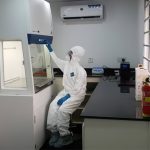
The global death toll in the novel coronavirus pandemic soared past the grim 200,000 milestone on Sunday, as the World Health Organization warned against “immunity passports” for recovered patients, seen as a possible tool for countries preparing to re-open their economies.
The WHO opposes such “passports” because recovery from the virus might not protect a person from reinfection.
“There is currently no evidence that people who have recovered from #COVID19 and have antibodies are protected from a second infection,” the UN health body said in a statement.
Meanwhile, hundreds of millions of Muslims around the world spent the second day of the Ramadan holy month out of mosques and avoiding large family meals to break the fast because of sequestration and social distancing policies.
And Australians and New Zealanders marked Anzac Day without the normal parades and public ceremonies to commemorate fallen soldiers. Instead, under social distancing policies, people held dawn vigils in front of their homes.
Even as governments from Sri Lanka to Belgium to the United States began moving in the direction of partial reopening, the COVID-19 pandemic still had nearly half of humanity under some form of lockdown or confinement.
Total cases around the world rose to 2.86 million and deaths mounted past the 200,000 mark, doubling since April 10, according to an AFP tally.
Europe, the hardest-hit region, has recorded 122,171 coronavirus deaths.
The US toll rose by 2,494 over the past 24 hours to hit 53,511 deaths. The number of coronavirus cases in the United States jumped by nearly 46,000 to 936,293 since Friday.
In Italy, the number of COVID-19 fatalities rose to 26,384; Spain 22,902, France 22,614 and the United Kingdom 20,319.
The world remained in wait as companies and governments raced to develop treatments and, eventually, a vaccine for the virus, which first surfaced in China in late 2019.
The WHO warned on Saturday that people who test positive and survive infection cannot be certain they will not be hit again by the coronavirus.
The warning came as some governments study measures such as “immunity passports” for those who have recovered as one way to get people back to work after weeks of economic shutdown.
People holding such a “passport” may tend to ignore public health advice, such as continuing to wear facemasks, assuming they are not a danger to themselves or others, the WHO said.
That is a particular worry as testing becomes more widespread, especially testing for coronavirus antibodies, whose presence indicate a person had previously contracted the virus and recovered.
“If I’ve already had corona then I’m not infectious,” said Berlin resident Lothar Kopp, hoping to test positive for antibodies as it could allow him to visit his elderly mother.
Germany has carried out tens of thousands of tests and other countries are also working on determining so-called levels of immunity.
AFP




